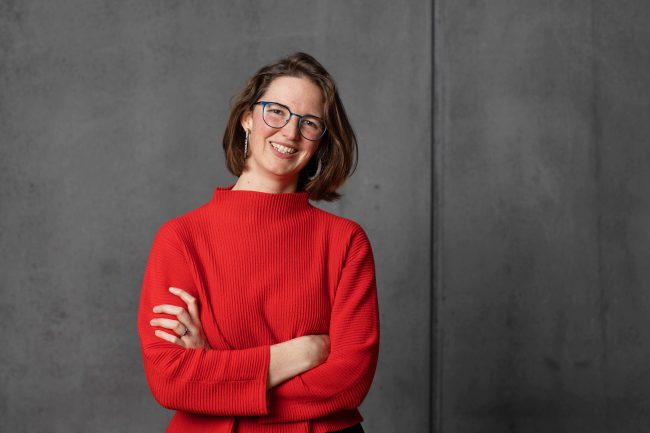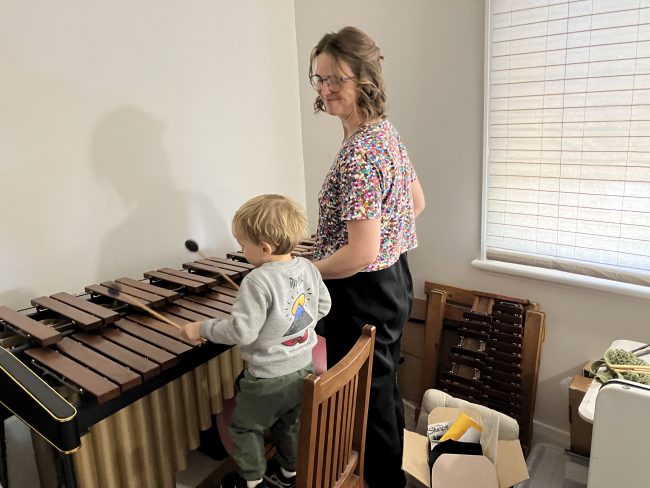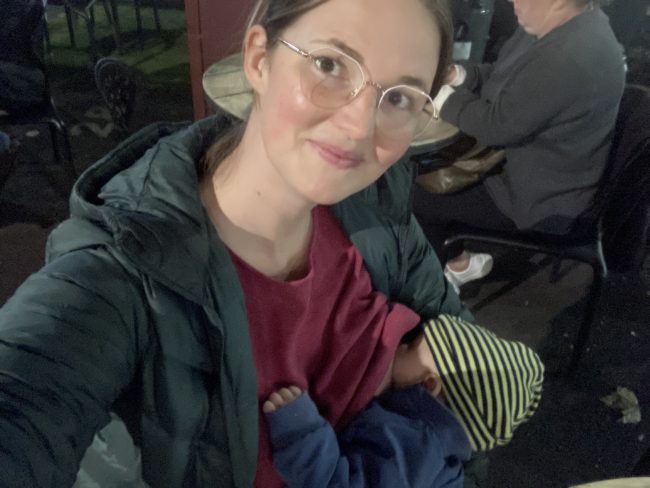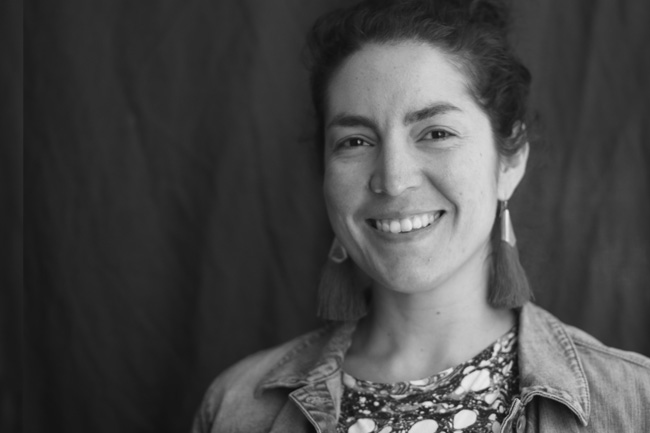Motherhood & Music – Not just the Lullaby
Approx. 7 minutes 30 seconds to read
My next interviewee, Thea Rossen, is a true sound explorer. As a percussionist, improviser and composer, she will guide you to a sonic world that you may never have known without her leading the way. I’ve had many opportunities to see her at work and observe her artistry and craft to engage audiences of all ages in thought provoking experiences. She brings joy to her performances whether she is exploring the enchanting sounds of water and ice as in her brilliant Drip Drop Play program, or premiering the spectrum of sound and colour of newspapers and cardboard containers in The Milk Carton Confessions composed by Michael Sollis.

Through this interview I’ve learnt a new word from Thea, that being “matrescence”. Read on to learn more about what this means and other thoughts Thea has to share about Motherhood & Music. She also offers helpful advice on where to find more information and support for mothers in the music world.
Sonia de Freitas: Hi Thea, how are you and where does our interview find you today?
Thea Rossen: Hi Sonia I am working from home today in Walyalup/Fremantle, WA. It has been a busy start to the year for me and my ensemble Ad Lib Collective. In January we spent 2 weeks at the Sydney Opera House presenting our children’s show Drip Drop Play in a sold out season to over 900 kids and their families. Since then I have developed a new work with collaborators that sonically tracks the cycle of an eclipse and is now part of an installation in the Perth Festival. This week I am taking some time to reset before I begin a creative development for a new work with Sensorium Theatre and rehearsals for a performance of Bartok’s Sonata for Piano and Percussion at UWA soon.

SdF: Can you tell me a little more about your life as a mother and musician?
TR: I have one son, Felix who is 3 years old. We just celebrated with a pirate party last week! Felix loves music and has his own mini drum kit, a ukulele and plastic saxophone. My husband Jesse is a saxophonist and woodwind teacher so we have lots of music in our house. Jesse and I lived together in Naarm/Melbourne for 7 years but moved back home when Felix was born to be close to family. I work as a freelance creative three days a week and have Felix the other two days. We’re incredibly lucky to have lots of family support in WA which has meant that I have been able to get back into work since Felix was around 6 months old, including national projects and some touring.
SdF: What, if anything, may have changed for you in relation to the way you thought about music and your ambitions as a musician once you became a mother?
TR: There is a term I only discovered after having Felix, matrescence, which is the physiological, physical and emotional process of becoming a mother. So much changes in your body, mind and family dynamic once you have a child that it can feel like it is hard to keep hold of the old you. For me this process of becoming a mother while also being a freelancer has challenged everything I thought I knew about myself, and honed my skills for prioritising, setting boundaries and making space for creativity and rest. Through all of that, I have found a clarity in my desire to create and connect with audiences through music and performance. And also a drive to find balance between the intensity of freelance portfolio based work and mum life.
SdF: How does the experience of motherhood influence your creativity and composition process?
TR: Because free time is so precious as a parent, it has helped me to clarify what is really important and made me much more focused and driven to work on the projects that I am passionate about. I have to be careful with how I use my time and my energy levels, because both are finite with a toddler around. I also know that I need uninterrupted time to create and develop ideas, so whether that is on a residency or late at night I will find ways to make that happen.

SdF: How do you maintain your artistic identity and career trajectory while raising your children?
TR: As a freelancer running a portfolio career I wear many hats between different projects including marketing, fundraising, composing, performing, project management and so on. So in a sense being a mum often just feels like another hat and makes a nice fit into an artistic identity. On the other hand, it is a constant juggle and one that needs lots of family support. But I find that when I get that balance right it is a welcome shift to switch between creative work and mum life.
SdF: What challenges have you faced in balancing the demands of motherhood with the demands of a music career? Conversely, can you share any unique opportunities brought about by motherhood?
TR: One of the big things I have learnt about being a parent is relinquishing control of an outcome. It is impossible to predict what sort of baby you’ll have, when they’ll feed and how easy or not that will be, how sleep will go, when they will walk and so on, and I’m discovering that toddlers’ moods are even harder to predict at times! As someone who was trained as a classical musician and loves to know what is coming and how to plan for it, that has been tricky but also liberating. It has meant that I have to build in buffer time around projects and parenting to account for the unexpected. It has also meant that I cannot do the volume of projects that I was able to do before kids, but in a way I was coming to realise that wasn’t sustainable either way. In this way being a mother has given me time and space that I may not have afforded myself otherwise.
Other parents will know that you cannot be half present with a baby or toddler – I love falling into the world of play and discovery with Felix on my days with him and I think it makes me a better more focused artist when I return to my work.
SdF: What role do societal expectations and stereotypes about motherhood play in shaping the public perception of musicians who are mothers?
TR: I think this is changing, but there is a perception that once you have a kid you are no longer a freelancer. It is certainly the case that there are not a huge number of us. But with support, it is possible, and hopefully we are showing people to think twice before deciding for us.

SdF: How can the music industry evolve to better accommodate the needs of musicians who are navigating the intersection of motherhood and their music careers?
TR: It seems to me that the government is playing catch up in the ways that it supports working mothers in general, so lobbying on our behalf would be one way to support musician mothers around things like Paid Parental Leave for partners, and also looking into things like how tax laws impact touring artists. For example, while on tour with my son when he was much younger I couldn’t claim the expense of bringing a carer along for him while I worked as a deduction, even though that money was spent directly in the production of income. This meant that though I was doing the same work as my male colleagues I was earning less than them because I was a mother. These are very dry and boring topics, but this gap in understanding of what goes into creating and sustaining work as a freelance mother has a real life impact. More generally support around touring artists with young children, safe spaces for breastfeeding and pumping at venues and gigs that are child friendly are all ways that the wider music industry could be more inclusive towards creative parents and carers.
In terms of support, there are some wonderful communities of creative mothers and parents that I have found online. These are some instagram accounts that share stories of the experience of motherhood as a creative artist:
@findthemotherlode (practical resources for independent musicians who are mothers or primary carers by Georgia Fields),
@controlpodcast (about women working in the music industry – Chelsea Wilson).
SdF: Is there anything else you want readers to understand about motherhood and music?
TR: Something that surprised me with becoming a parent was the amount of mum guilt I would feel about being away from my son to work or take any time for myself, but I know that I am a better mum when I have a creative project to develop alongside raising my son. These two parts of my life enrich each other and I couldn’t imagine things a different way. Felix has shown me a way to look at life that is uncomplicated and full of wonder and joy. And through my work, I hope to show Felix that women and especially mums are capable of doing incredible things.
To learn more about Thea Rossen visit: thearossen.com
To hear and purchase Thea Rossen’s music visit:
adlibcollective.org
bandcamp.com/album/glass-heart
For more information on International Women’s Day visit: internationalwomensday.com

Photo credit: Cathy Kirkpatrick
Keep an eye out for my next interview in the Shout Sister Shout: Motherhood & Music – Not just the Lullaby series where I interview Jenny Eriksson.
Did you miss the previous Shout Sister Shout instalment? Read Andrea Keller’s 2024 interview here.
Thank you to Eastside Radio for making the Shout Sister Shout: Motherhood & Music – Not just the Lullaby interview series possible.
I acknowledge the Traditional Owners of the many lands on which I am privileged to work, learn, teach, create and perform. I extend my respects to all First Nations People.